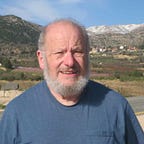The one thing people can agree on about Truman’s decision to drop the atomic bombs is there is no agreement as to whether it was wise and necessary.
I was ten years old at the time and I understood what was happening. I remember the passionate and dehumanizing hatred of the Japanese among Americans, which certainly affected the decision.
My own view of those events is that dropping the nuclear bombs did indeed bring about the Japanese surrender. The many accounts of the meetings of the Japanese cabinet and the intervention of the Emperor certainly demonstrate that. But that does not imply that dropping those bombs was necessary to end the war without an invasion of the Japanese home islands, and indeed it wasn’t. There were other ways of compelling the surrender, including publicizing an account of the Trinity test or even a second demonstration of the power of those awesome weapons. It would have taken longer to end the war, but would not necessarily have cost many American (or Japanese) lives.
The Japanese cause was hopeless, and they knew it. The same considerations that eventually convinced them to surrender, including the entry of Russia into the war, would have had their effect before long. We could have afforded to wait, and would have saved many lives by doing so.
And yet, suppose we had not dropped the bomb and the war still had come to an end. The United States and Russia would surely have continued developing and building atomic bombs, and would have been joined by other nations.
If a conflict erupted, there would have been far fewer inhibitions about using those bombs. Any serious conflict would probably have gone nuclear because the parties would not have actually seen what nuclear devastation looks like.
The use of atomic bombs in World War II might well have prevented them from being used in a far wider and more devastating war.
